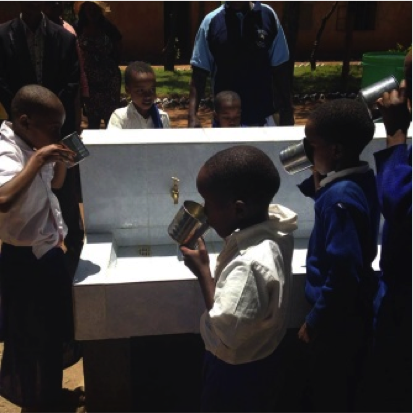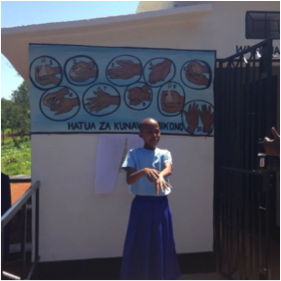This article was contributed by Maria Bystedt, Project Manager of the H&M Conscious Foundation.
On a recent trip to Tanzania I was able to see first-hand how important collaboration is to the effective establishment of WASH services.
I travelled to Babati in the district of Manyara to see some of the transformational changes WaterAid are delivering in schools. The H&M Conscious Foundation is working with WaterAid on a three-year programme to deliver access to clean water and sanitation and promote good hygiene practices in schools for 250,000 students across some of the world’s poorest countries, including Tanzania.
Home to over 52 million people, Tanzania is the largest country in East Africa. Its exceptionally hot and dry climate means safe water is scarce and growing enough food to live on is often difficult for the mostly rural population.
The statistics speak for themselves. I felt incredibly sad and frustrated when I read that 14 million people in Tanzania have no safe water, and around 27 million (just under 50% of the population) don’t have access to a decent toilet.
These issues have a huge impact on health – more than 7,000 children under five die each year from preventable waterborne diseases caused by unsafe water and inadequate sanitation. There are wider impacts too – on education, livelihoods and wellbeing.
When it comes to WASH in schools, clean drinking water, and a safe place to use the bathroom are just as important as teachers, classrooms and books. When these crucial tools aren’t readily available, students spend less time learning because of sickness or time spent collecting water. The situation is especially bad for teenage girls, who also need to manage their periods – inadequate facilities are a major reason for low attendance and students dropping out of high school.
After a long drive, we stopped at Dareda Mission primary school in the small village of Lote, where we joined the proud unveiling of a new girls’ toilet block.
 H&M Conscious Foundation photo from Tanzania
H&M Conscious Foundation photo from Tanzania
In addition to improving access to clean water and new toilets, the H&M Conscious Foundation project is working with partner DMDD (Diocese of Mbulu Development Department) to promote good hygiene practices and cleanliness.
I was so impressed to see how learning simple handwashing skills, which we take for granted, were effective on so many levels. Not only did students feel empowered by better knowledge and understanding of hygiene, they could see their health improving as a result too. These students really do act as change agents, passing on what they have learned to their families and encouraging behaviour change in their communities.

Aside from our work with WaterAid, the H&M Conscious Foundation has also teamed up with development charity Practical Action to bring clean water and safe sanitation to one of the poorest communities in India – Khurda city in Odisha. The three-year project will transform the lives of 45,000 people.
Since the $1.33 million USD commitment made last year at the Global Citizen festival, I’m excited to see the baseline studies be completed and to identify sites where we’ll focus our project work. Community sharing meetings have been conducted in all the selected slums involving the outlining of programme objectives and activities, and the role of the community. All the meetings have been organised with the presence of local leaders and councillors. The existing water/sanitation services situation and issues have also been identified.
In addition, Practical Action is starting to form sanitation committees as well as strengthening previous ones, and initiating our awareness programmes. These programs will involve using local folk media to reach communities through community mobilisers and recognised entertainers and events coordinators; providing materials, training and outreach support to community groups and institutions, as well as using mass media, rallies and campaigns.
In Tanzania, what really struck me was how important it was for every single part of the community to work together to achieve long-term change, from local stakeholders – such as school management committees, parents and the wider community – to local and national government. Through working holistically with a wide range of partners, including government, civil society and the private sector, we can leverage our influence at local and international levels in order to drive change and deliver sustainable results.
The private sector, NGOs and governments need to work together in ways we haven’t before. We need a more structured approach so as to work more effectively. If government stakeholders lack the support and knowledge they need in certain areas, we need to offer expertise where we can. And when we’re not working together as well as we could be, we need to find ways of contributing to a joint plan.
It’s this holistic approach that will drive the change needed to put these much-needed school WASH policies into place. WaterAid and H&M Conscious Foundation have reached more than 100,000 school students with access to safe water, sanitation and hygiene promotion so far – That’s a great achievement and we’re well on the way to reach our target. I feel passionately that, with all the wonderful communities and stakeholders working collaboratively in places like Babati, we can make this happen.
The views expressed here are not necessarily those of each of the partners of Global Citizen.